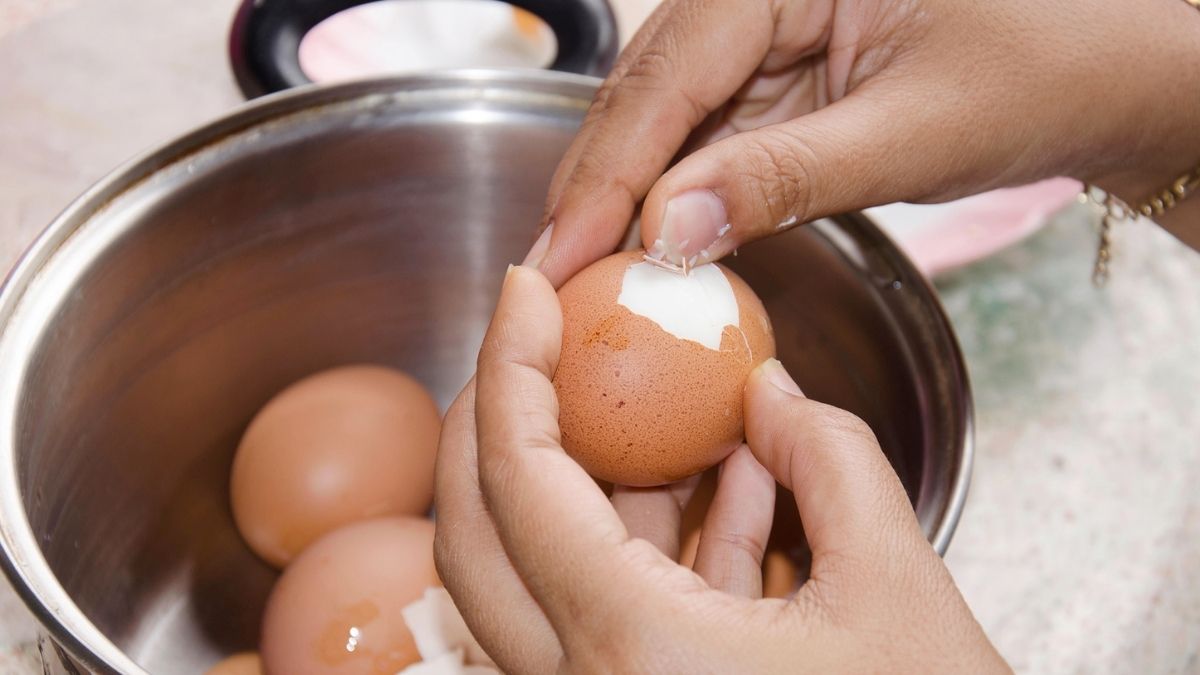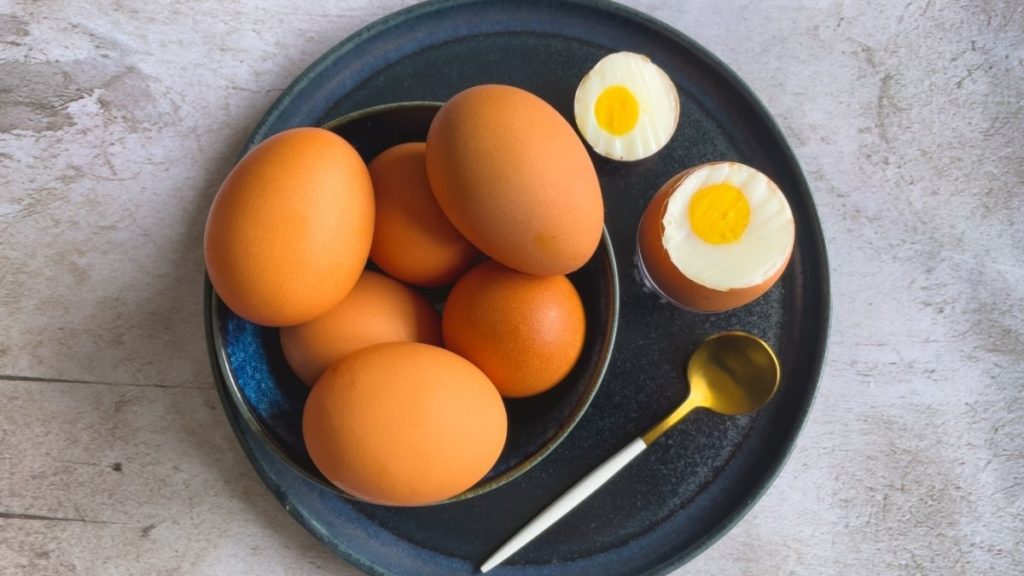Most healthy people can eat up to seven eggs a week without hurting their heart health. Some people only eat the egg white and leave out the yolk, which gives them protein without cholesterol. Conversely, according to a study in The New England Journal of Medicine, eating two hard-boiled eggs daily increased the risk of heart attack and stroke.
This is because egg yolks have lecithin, a fat that helps make trimethylamine N-oxide (TMAO), which can cause these heart problems. You get more high-density lipoprotein (HDL) when you eat eggs, also called “good” cholesterol. People whose HDL levels are higher are less likely to get heart disease, a stroke, or other health problems.
One study found that eating two eggs every day for six weeks boosted HDL levels by 10%. Good cholesterol is called high-density lipoprotein (HDL). People who have the right amount of HDL cholesterol are less likely to get heart disease and other diseases of the heart and blood vessels.
A study found that eating two eggs every day for six weeks can increase HDL 10%. Overall, cooking methods that are shorter and use less heat cause less cholesterol to oxidize and keep most of the egg’s nutrients. Because of this, eggs that have been poached or boiled (hard or soft) may be the healthiest to eat. Also, these ways of cooking don’t add any extra calories.
What is an Egg?
Birds lay the eggs we eat like chickens, ducks, and even ostriches. Inside their thin shells is a clear, liquidy, protein-rich egg white called albumen and a thin, yellow yolk called lipids full of vitamins and good fats. Eggs are a complete protein, which means they have all the amino acids that our bodies need. But their proteins also make people with allergies sick: 2% of children have an allergy to eggs (typically due to the proteins in egg whites, though some are also allergic to the yolk.
How to Cook and Peel Hard-Boiled Eggs?
The best way to peel hard-boiled eggs is to put them in a bowl of ice water after they have been cooked. Follow the steps below for hard-boiled eggs that will always be easy to peel:
- Cover the eggs with water- Put eggs in a pot of water on the stove, and the water should cover the eggs by at least an inch.
- 2. Simmer the eggs- Turn on the stove and bring the water to a rolling boil. Simmer the eggs for 15 minutes in boiling water to get firm egg whites and yolks. (The time it takes to cook will depend on how you want the eggs. For example, boil eggs for three minutes to soft-boiled with a runny yolk.)
- Remove the cooked eggs- With a slotted spoon, take the eggs out of the pot and put them in a large bowl filled with ice. Putting the eggs in cold water will stop them from cooking and make them easier to handle when you want to peel them.
Tap the eggs- When the eggs are at room temperature, which takes about 15 minutes, tap them gently on the counter or table to crack the peel. To break the eggshell, tap the top and bottom of the egg before tapping the sides.
Peel the egg- Peel the egg carefully, starting at the wide end at the bottom. This will break the air pocket between the egg and the shell. Peel the shell off gently, so you don’t break the egg whites.
3 Tips for Peeling Hard-Boiled Eggs
You can put hard-boiled eggs on a healthy salad, serve them as an appetizer (like deviled eggs), or put them on a sandwich (such as an egg salad sandwich). Follow these steps to make eggs that are easy to peel for recipes that call for eggs:
Use older eggs-
Fresh eggs just laid by hens are harder to peel because the shells are still soft. Older eggs have less water than a dozen eggs from the grocery store, so the shell and membrane are easier to separate. Use older eggs to make sure they are easier to peel.
Use vinegar and salt-
Add a quarter cup of vinegar and a teaspoon of salt to the water you use to boil the eggs. The eggshells will be easier to peel after the salt and vinegar have softened them.
Peel the eggs in water-
After you boil the eggs, put them in a bowl of ice water to cool them down, then put them in a bowl of water at room temperature. Crack the egg against the bowl, then peel it under running water. The water will help separate the eggshell, membrane, and egg whites.
Are Eggs & Dairy Vegetarian? Are They Vegan?
Vegetarians usually don’t eat anything that took an animal’s life to make, but many still eat dairy and eggs because they don’t hurt the animals. On the other hand, Vegans don’t eat anything made from animals, like eggs or milk.
People who have to watch what they eat can understandably find this confusing. You need to know this: If a vegetarian product, it might have eggs and dairy in it. If a vegan product, it won’t have eggs or dairy. If a product says “dairy-free,” it could still have eggs. If a product is “egg-free,” it could still have dairy.
Are Eggs Good for People with Diabetes?
Yes, is the short answer. Based on what we know about how to lower the chances of getting type 2 diabetes, eating better is one of the easiest ways to do so. Eggs are a portion of very healthy food, and they are a good source of high-quality protein, healthy fats, vitamins, minerals, and antioxidants. They are also easy to prepare and taste great. And since being overweight is a risk factor for type 2 diabetes, eating eggs regularly makes it easier to control your appetite and gives you a better sense of being full.
Will I Get Diabetes From Eating Eggs?
A single food does not cause diabetes, and the most important thing is to eat eggs as part of a healthy, varied, well-balanced diet. High levels of glucose in the blood are the main sign of diabetes. Diabetes is caused by a person’s inability to make insulin, a hormone made by the pancreas that controls how much sugar is in the blood, the body’s inability to use insulin well, or sometimes by both.
The Most Common Types of Diabetes Are;
Type 1 Diabetes-
Type 1 diabetes is an autoimmune disease that usually starts in childhood or early adolescence and stays with a person for life. Even though the exact cause is mostly unknown, it is thought that environmental and genetic factors work together to cause it. It’s a serious health problem that can’t be fixed, but it’s very easy to treat by today’s standards. Usually, type 1 diabetes needs to get an insulin injection every day to stay healthy and live.
Type 2 Diabetes-
Type 2 diabetes is the most common type closely linked to how a person lives.
Most of the time, type 2 diabetes comes on later than type 1 diabetes. People with type 2 diabetes usually make insulin, but they either don’t make enough or can’t use it well. Even though genes can cause it, type 2 diabetes is mostly caused by how people live. The risk of type 2 diabetes goes up when people don’t get enough exercise, eat poorly, drink too much alcohol, are overweight or obese, or smoke.
Can Eating Eggs Help you Lose Weight?
Eggs may help promote weight loss for the following three reasons:
1. Eggs are nutritious and low in calories-
There are 78 calories in a large hard-boiled egg. some important nutrients, such as
- lutein and zeaxanthin, which are antioxidants that help keep your eyes healthy.
- Vitamin D is good for your bones and helps your immune system work well.
- Choline speeds up the body’s metabolism and helps a baby’s brain grow.
The easiest way to lose weight is to eat less, and adding eggs to your diet might help. For example, two hard-boiled eggs and a cup of mixed vegetables can be a lunch or dinner. Only 274 calories. But cooking eggs with oils or butter makes them have more calories and fat. For example, there are 119 calories in a tablespoon of olive oil.
2. Eggs are Rich in Protein-
Protein helps you lose weight because it makes you feel full. Eggs are a good source of protein, with about 6 grammes in one large egg.
Protein should be eaten at 0.8 g per kilogramme of body weight.
This means that :
- The average man who does nothing daily needs 56 g of protein every day.
- The average woman who does nothing daily needs 46 g of protein per day.
So, two large eggs meet more than 25% of a passive woman’s daily protein needs and more than 20% of a passive man’s daily protein needs.
Eating a protein-rich breakfast makes a person feel fuller. The results also show that eating a breakfast with a lot of protein makes people eat less the rest of the day.
Which was published in the British Journal of Nutrition that eating protein helps treat obesity and metabolic syndrome because it makes people feel fuller.
3. Eggs can Boost the Metabolism
Through a process called the thermic effect of food, eating a lot of protein can speed up the metabolism.
It happens because the body needs to use more calories to digest and use the nutrients in food.
Carbs and fats also speed up the metabolism, but not as much as protein does.
- Protein speeds up a person’s metabolism by 15–30%.
- Carbohydrates raise the rate of metabolism by 5–10%.
- Fats can speed up the metabolism by as much as 3%.
So, eating eggs and other high-protein foods may help people burn more calories than eating carbs or fats.
Conclusion
Some research has found a link between eating eggs and keeping blood sugar under control. A recent international study of 42 overweight adults with either prediabetes or type 2 diabetes found that eating one large egg per day decreased fasting blood sugar by 4.4% and improved insulin sensitivity overall compared to eating an egg substitute.
Eggs are a good source of protein, and they also have at least 13 vitamins, minerals, omega-3 fatty acids, and active antioxidants, so they are a great way to meet your daily protein and nutrition needs. At Australian Eggs, we stay on top of all the latest research. However, please talk to your doctor or nurse if you need specific advice.


